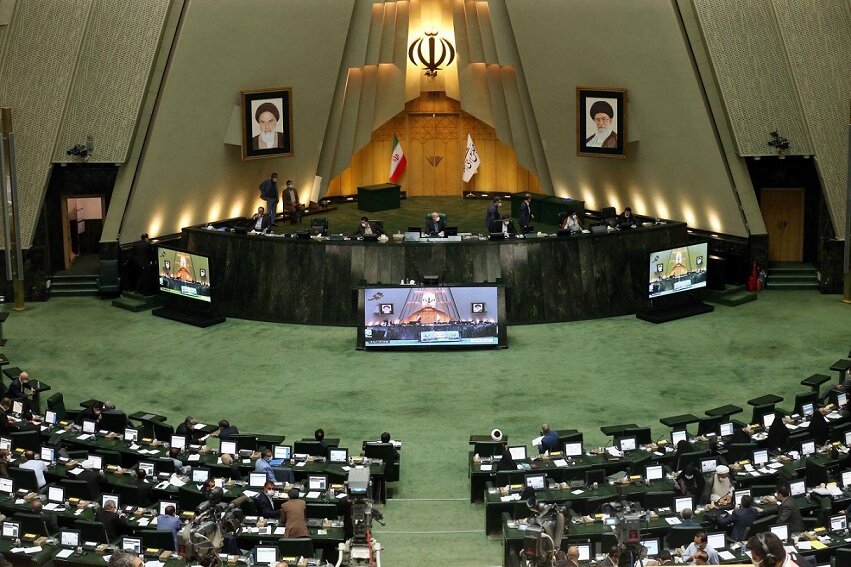TEHRAN – As the nation mourned the assassination of prominent nuclear scientist Mohsen Fakhrizadeh, Iranian lawmakers made major strides toward halting the implementation of the Additional Protocol to the nuclear Non-Proliferation Treaty (NPT).
Although putting an end to the voluntary implementation of the Additional Protocol has now been under consideration for nearly a month, but the Friday attack on the nuclear scientist has given special momentum to the Iranian Parliament’s efforts to significantly resume the nuclear activities most of which were put on hold after the implementation of the 2015 nuclear deal between Iran and world powers, officially known as the Joint Comprehensive Plan of Action (JCPOA).
On Friday at 14:30, nearly 10 people attacked the convoy of Fakhrizadeh on a highway in the small city of Absard in Damavand County, about 40 kilometers northeast of the capital Tehran. The scientist lost his life during the attack while his bodyguards were severely injured. Iranian officials were quick to point the finger at Israel, which has carried out many assassination operations against Iranian nuclear scientists over the past decade. Foreign Minister Mohammad Javad Zarif said in a tweet on Friday that the attack was carried out with “serious indications of Israeli role”.
This attack raised hackles in Tehran, prompting lawmakers to expedite the legal process of passing a bill that would remarkably increase Iran’s nuclear activities and strictly restrict its cooperation with the International Atomic Energy Agency (IAEA).
Last week, the Parliament’s National Security and Foreign Policy Committee discussed the detail of the bill, which is called “strategic action to lift sanctions.”
The bill is part of a broader strategy that aims to lift the United States sanctions on Iran and was put forward by the lawmakers in early November. It aims to force the United States into lifting sanctions on Iran by doubling down on nuclear activities.
If passed, the bill would compel the government to considerably increase nuclear activities such as increasing uranium enrichment level to 20% and employing more advanced centrifuges.
The bill also requires the government to suspend the voluntary implementation of the Additional Protocol to the nuclear Non-Proliferation Treaty (NPT) three months after the ratification of it if the parties to the nuclear deal between Iran and world powers failed to uphold their obligations under the JCPOA.
Over the last few weeks, the lawmakers have been regularly holding meetings to discuss the details of the bill. The martyrdom of Mohsen Fakhrizadeh has only intensified these meetings, especially after the Leader of the Islamic Revolution of Iran, Ayatollah Seyed Ali Khamenei called on all authorities to continue the scientific works of the late scientist.
“All authorities should put two things seriously on agenda, first investigate the crime and decisively punish the perpetrators and those who ordered it, and then continue scientific and technical efforts of the martyr in all sectors in which he was involved,” the Leader said in a statement Saturday, a day after Fakhrizadeh was assassinated in Absard.
In line with the leader’s directive, the Parliament held a session behind closed doors on Sunday to discuss the assassination of the scientist and the bill to lift sanctions. Following the session, Parliament Speaker Mohammad Bagher Ghalibaf said the lawmakers have discussed the bill and that it will be finalized this week. He referred to the bill as a response to the killing of Fakhrizadeh.
“This plan will strengthen the industry and the practical achievements of nuclear scientists and pave the way for Iran to overcome sanctions. This law, along with the reactions of other relevant agencies, in addition to reviving Iran's nuclear industry, creates deterrence against the enemy and security for the people,” Ghalibaf said.
The bill provides a step by step process for the government to halt the implementation of the Additional Protocol. According to the bill, the government would be obliged to prevent any foreign access and monitoring beyond the Additional Protocol within two months after the enactment of the bill. And if oil exports and banking ties between Iran and Europe were not normalized within three months after the enactment of the bill, the government would be obliged to halt the voluntary implementation of the Additional Protocol.
This strategy has gained steam in recent days, with some officials even calling on the government to reconsider cooperation with IAEA.
“The least slap that we can give to the perpetrators of this terrorist crime is that our government should stop the voluntary implementation of the Additional Protocol and that the Nuclear Energy Organization should reconsider the inspection regime and immediately put on the agenda minimal measures such as suspending the online broadcasting of cameras, reducing or suspending inspectors, and imposing restrictions on inspectors' access to Iranian nuclear sites and scientists,” Mohsen Rezaee, the secretary of the Expediency Discernment Council, said in a meeting with the family of the late scientist.
The assassination of Fakhrizadeh once again raised questions on the logic of Iran’s compliance with the Additional Protocol, with some pundits asking why Iran should abide by the provisions of the Additional Protocol while other parties to the JCPOA don’t keep up their end of the bargain. How did the Additional Protocol benefit Iran over the past few years? Why should Iran keep abiding by the Additional protocol while its nuclear scientists are being targeted before and after the signing of the JCPOA? Did international inspectors pass information of Iranian scientists and nuclear sites on to Western intelligence agencies? Do these inspectors spy on Iran’s nuclear program?
TAGS


No comments:
Post a Comment